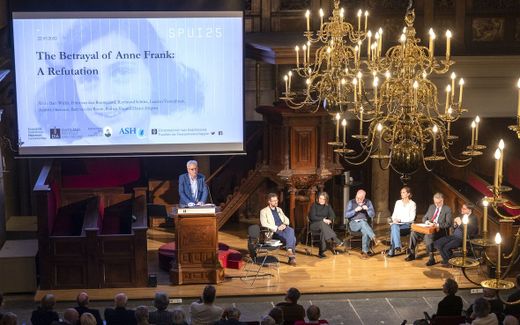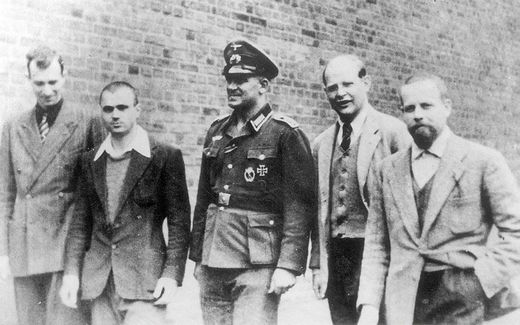A German-Norwegian family as fruit of the war
06-05-2022
Northern Europe
Knut Reier Indrebø, KPK
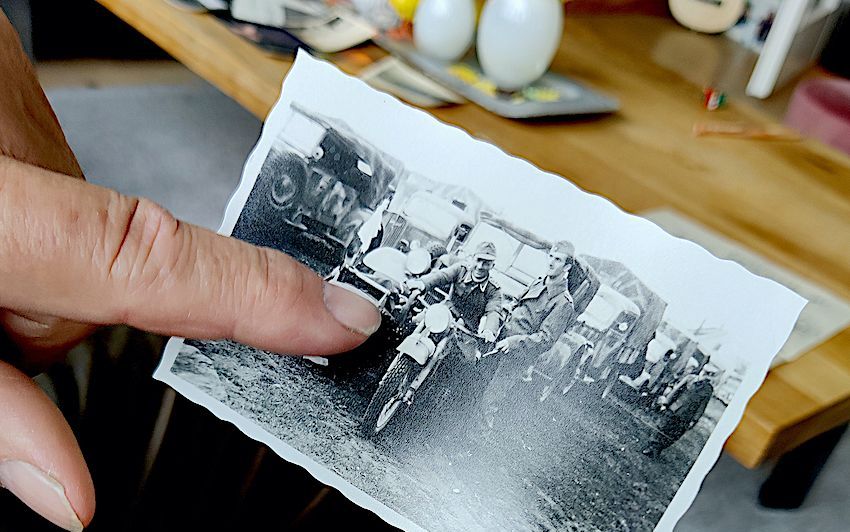
The German sergeant Theodor Reutter on the motorbike in the Second World War. He was sent to Norway, where he stayed with a Christian family. His grand daughter married to a cousin of that family. Photo Knut Reier Indrebø, KPK
Northern Europe
Winter 1944. The German sergeant Theodor Reutter folded his hands over breakfast in Norway. He didn't know this would have unexpected consequences for several generations.
re is happy chaos at home with the couple Manuela and Harald Sevland when three generations break up from the breakfast table and chat in a mixture of German and Norwegian. Half of them are guests in the house, on holiday from Tübingen in southern Germany, the city Sergeant Reutter came from. In a way, all this chaos –and Manuela and Harald's marriage– is due to him saying grace back in 1944 in the southwestern Norwegian district Jæren.
Bold invitation
Reutter, who was Manuela's grandfather, was involved in the German invasion of Norway in April 1940. He was later stationed in several places in the country until he came to Bore on Jæren towards the end of 1944. He and 16 fellow soldiers were to monitor a bridge at Bore church. As occupying forces do, the Germans took action and seized the house closest to the bridge. The village's blacksmith, Sigurd Damsgård, and his wife, Anna, lived there. They were the uncle and aunt of Harald's father, Arthur.
The owners quickly became aware of one of the soldiers as he ate his food. He always folded his hands and prayed for the food. When Anna saw the soldier praying, she thought that this guy also had a mother who prayed for him at home. It gave her extra care for him, and the Norwegians made a bold move.
"You will sit at the table with us", they informed the occupier.
The invitation also gave them security. The soldiers promised not to destroy anything, and there were extra guards outside to take good care of those who lived there.
Correspondence
"Because of the Christian faith, the three of them immediately got a close relationship. That connection and friendship lasted, even though one was an occupier and the other two occupied", says Manfred Reutter, Theodor's son.

In the spring of 2022, he is sitting in the living room of his daughter Manuela in Sele, a short distance from "Smiå" in Bore. He reads from a letter his father wrote to his Norwegian friends in 1948. He thanks for the time being in Norway and tells of bad times: "We are grateful, even though we have still not received new clothes, wool and shoes since the war. Our Father in Heaven has helped us to this day and will continue to do so in the future."
A four-month-old boy is mentioned in the letter. That is Manfred himself.
"When my father talked about Anna and Sigurd, it was with great gratitude. He referred to them as close friends. Father said he felt "homesick" for Norway when he returned to Germany. The three of them must have left traces in each other's hearts. But because of the bad times, it still took 24 years before Theodor returned. Meanwhile, they continued staying in touch through letters. They were sent for Easter and Christmas, sometimes even more often, says Manfred.
Sigurd and Anna did not have any children themselves, and Manfred became like a son to them.
"Eventually, I had heard so much about them that I myself felt I knew them and the names of all the places and the stories. Then there was also often something for me in the letters we received. I always got presents for Christmas, whether it was a small knife, some candy or that kind of stuff", says Manfred, who visited Norway for the first time in 1968. He speaks about a memorable experience at that time.
Sigurd found coffee tableware that his father had received from the company for his wedding in 1945. He could not take it with him when he left, and it was stored at Anna and Sigurd's. "Your father must come to Norway himself and pick up the crockery if he wants it," Sigurd told me then.
Summer hotel
Theodor came the following year, and from then on, the family visited Norway almost every other year. They lived in a simple cabin that Sigurd had built for them, and the message was that they could come and go as they pleased, both in the cabin and at their home. As the family grew, the cabin became too small, and they used a larger one nearby.
Manuela remembers it as fantastic summers and that she experienced Sele and Jæren as her second homeland. For children who grew up in southern Germany, far from the sea, it was exotic to live in Sele.
"Sele was like a paradise. We were on the beach and bathing and were always sunburned. We nicknamed the house we lived in «Sele beach hotel», even though it felt like our home in Norway. It was great for the family of eight to travel together", says Manuela.

Anna and Sigurd introduced the Germans to the whole extended family. The summer evenings usually offered a visit to some of the relatives.
How did others view this friendship? Did they encounter any adverse reactions?
"Some very few Norwegians were negative and expressed it. But my impression was that there were few problems. I have heard that people thought the Germans behaved well, paid for themselves, and were polite", says Manfred.
"We were welcome everywhere. I remember we had so many people to visit in Norway that we brought a whole suitcase just with gifts. Mom says that everyone was so kind to us, no matter who we met. They also came to visit us in Germany", says Manuela.
The fruits of war
Manuela never met Sigurd. When he was dying in 1986, Manfred was asked to come, and he was later asked to say a few words at the funeral. Manfred and Harald's father, Arthur, met in connection with this memorial. They found the tone immediately.

"I lost my Norwegian father and gained a new and strong friendship instead", says Manfred.
From then on, the German family –with six kids– lived at his home when they came to Norway. This is how Harald and Manuela eventually met for the first time in the late 1990s. After she later attended a Bible school in Stavanger for six months, they became a couple. Now the fourth generation is growing up in the house in Sele.
"Well, these too are the fruits of war", smiles Harald and looks at the kids jumping around the house. "God's ways are unfathomable", he says.
Theodor was still alive when Manuela and Harald married in 2006.
"My father had seen so many Norwegian-German marriages break down that he was critical of me finding a Norwegian wife. But when Manuela and Harald got together, it did not matter, as long as they had their faith in common. That is what has made the relationship between the families last through all these years. Christians are one people, across national borders and nations", says Manfred.
The Sevland family tries to convey both Norwegian and German Christian heritage. There has never been a need for reconciliation between the families after the war. War and politics have not been an issue between them.
"We have been in the same family all along", says Manuela.
This article was translated by CNE.news and published earlier by Norwegian Kristelig Pressekontor on 2 May 2022.
Related Articles

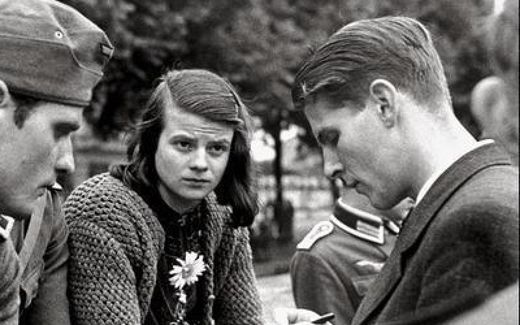
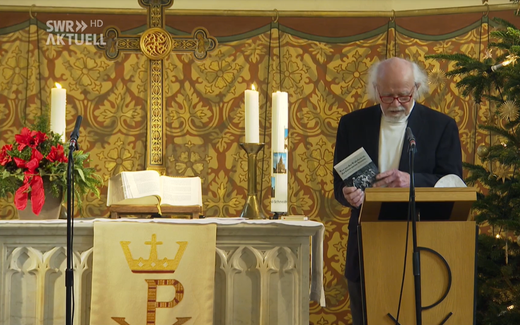
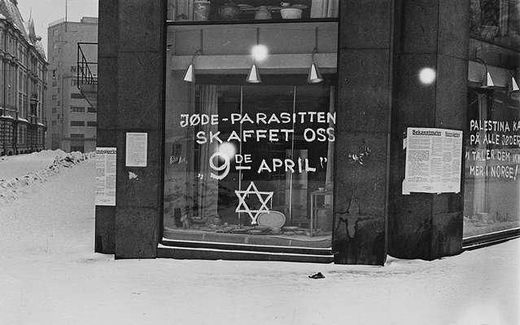

![During a state of emergency in Trøndelag from 6 October 1942, all male Jews were arrested by the Norwegian order police. They were interned in SS-Strafgefangenenlager Falstad outside Levanger . [106]](https://images.cne.news/fill/crop:1992:1245:sm/w:520/plain/s3%3A%2F%2Fcne-prod-s3-001%2FFalstad_1945_6260599608_8b75464012.jpg)
